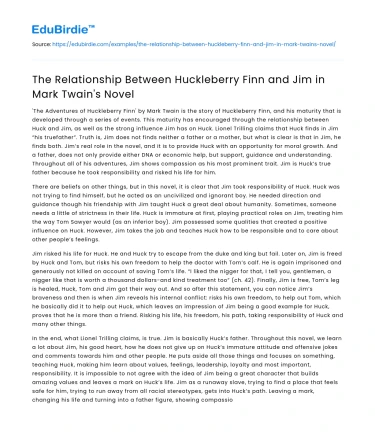'The Adventures of Huckleberry Finn' by Mark Twain is the story of Huckleberry Finn, and his maturity that is developed through a series of events. This maturity has encouraged through the relationship between Huck and Jim, as well as the strong influence Jim has on Huck. Lionel Trilling claims that Huck finds in Jim “his truefather”. Truth is, Jim does not finds neither a father or a mother, but what is clear is that in Jim, he finds both. Jim’s real role in the novel, and it is to provide Huck with an opportunity for moral growth. And a father, does not only provide either DNA or economic help, but support, guidance and understanding. Throughout all of his adventures, Jim shows compassion as his most prominent trait. Jim is Huck’s true father because he took responsibility and risked his life for him.
There are beliefs on other things, but in this novel, it is clear that Jim took responsibility of Huck. Huck was not trying to find himself, but he acted as an uncivilized and ignorant boy. He needed direction and guidance though his friendship with Jim taught Huck a great deal about humanity. Sometimes, someone needs a little of strictness in their life. Huck is immature at first, playing practical roles on Jim, treating him the way Tom Sawyer would (as an inferior boy). Jim possessed some qualities that created a positive influence on Huck. However, Jim takes the job and teaches Huck how to be responsible and to care about other people’s feelings.
Save your time!
We can take care of your essay
- Proper editing and formatting
- Free revision, title page, and bibliography
- Flexible prices and money-back guarantee
Jim risked his life for Huck. He and Huck try to escape from the duke and king but fail. Later on, Jim is freed by Huck and Tom, but risks his own freedom to help the doctor with Tom’s calf. He is again imprisoned and generously not killed on account of saving Tom’s life. “I liked the nigger for that, I tell you, gentlemen, a nigger like that is worth a thousand dollars-and kind treatment too” (ch. 42). Finally, Jim is free, Tom’s leg is healed, Huck, Tom and Jim got their way out. And so after this statement, you can notice Jim’s braveness and then is when Jim reveals his internal conflict: risks his own freedom, to help out Tom, which he basically did it to help out Huck, which leaves an impression of Jim being a good example for Huck, proves that he is more than a friend. Risking his life, his freedom, his path, taking responsibility of Huck and many other things.
In the end, what Lionel Trilling claims, is true. Jim is basically Huck’s father. Throughout this novel, we learn a lot about Jim, his good heart, how he does not give up on Huck’s immature attitude and offensive jokes and comments towards him and other people. He puts aside all those things and focuses on something, teaching Huck, making him learn about values, feelings, leadership, loyalty and most important, responsibility. It is impossible to not agree with the idea of Jim being a great character that builds amazing values and leaves a mark on Huck’s life. Jim as a runaway slave, trying to find a place that feels safe for him, trying to run away from all racial stereotypes, gets into Huck’s path. Leaving a mark, changing his life and turning into a father figure, showing compassion and not leaving him alone at any time, reveals the amazing personality of this character. Jim, Huck’s father. Not by blood, but by heart.






 Stuck on your essay?
Stuck on your essay?

